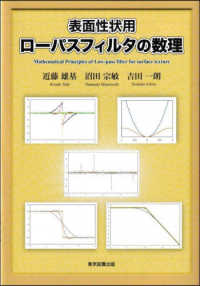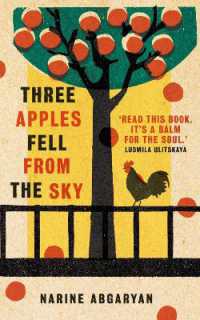Full Description
The San (hunter- gatherers) and Khoe (herders) of southern Africa were dispossessed of their land before, during and after the European colonial period, which started in 1652. They were often enslaved and forbidden from practicing their culture and speaking their languages. In South Africa, under apartheid, after 1948, they were reclassified as "Coloured" which further undermined Khoe and San culture, forcing them to reconfigure and realign their identities and loyalties. Southern Africa is no longer under colonial or apartheid rule; the San and Khoe, however, continue in the struggle to maintain the remnants of their languages and cultures, and are marginalised by the dominant peoples of the region. The San in particular, continue to command very extensive research attention from a variety of disciplines, from anthropology and linguistics to genetics. They are, however, usually studied as static historical objects but they are not merely peoples of the past, as is often assumed; they are very much alive in contemporary society with cultural and language needs.
This book brings together studies from a range of disciplines to examine what it means to be Indigenous Khoe and San in contemporary southern Africa. It considers the current constraints on Khoe and San identity, language and culture, constantly negotiating an indeterminate social positioning where they are treated as the inconvenient indigenous. Usually studied as original anthropos, but out of their time, this book shifts attention from the past to the present, and how the San have negotiated language, literacy and identity for coping in the period of modernity. It reveals that Afrikaans is indeed an African language, incubated not only by Cape Malay slaves working in the kitchens of the early Dutch settlers, but also by the Khoe and San who interacted with sailors from passing ships plying the West coast of southern Africa from the 14th century. The book re- examines the idea of literacy, its relationship to language, and how these shape identity.
The chapters in this book were originally published in the journal Critical Arts: South-North Cultural and Media Studies.
Contents
1. Introduction: Literacy, Language and Orality Amongst the KhoeSan KhoeSan Languages: Past to Present 2. The First Afrikaans 3. Afrikaans on the Frontier: Two Early Afrikaans Dialects 4. The Khoisan Languages of Southern Africa: Facts, Theories and Confusions 5. Contemporary Khoesan Languages of South Africa Same but Different: The Struggle Towards Integrated Societies 6. The Language Question: Khoisan Linguicide and Epistemicide 7. KhoeSan Identity and Language in South Africa: Articulations of Reclamation 8. Owning the Body, Embodying the Owner: Complexity and Discourses of Rights, Citizenship and Heritage of Southern African Bushmen Decolonising/ Indigenising Language: Experiences with KhoeSan Peoples 9. Methods of "Literacy" in Indigenising Research Education: Transformative Methods Used in the Kalahari 10. One Made by Many: the Recording of Present-Day Kalahari Stories 11. Language and Education: Photovoice Workshops and the !Xun and Khwe Bushmen 12. Locating Spaces for San Mother-Tongue Education in the South African Education Framework Repurposing San Communicatory Practices to be Meaningful in the Contemporary World 13. Hip-hop and Decolonized Practices of Language Digitization among the Contemporary !Xun and Khwe Indigenous Youth of South Africa 14. The Literacy of Tracking Orality: From Literature to Politics 15. The Society of the Text: The Oral Literature of the / Xam Bushmen 16. New Directions in / Xam Studies: Some of the Implications of Andrew Bank's Bushmen in a Victorian World: the Remarkable Story of the Bleek- Lloyd Collection of Bushman Folklore 17. Broken Strings: Interdisciplinarity and / Xam Oral Literature 18. To Whom It May Concern: Or, Is Anyone Concerned? The Nyae Nyae Ju/ 'hoan Tape Archive, 1987- 1993








